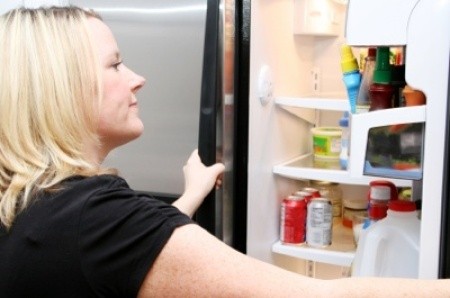We're governed by our habits, and while some of them are simply irksome, others serve a purpose. After coaxing the last spurt of shampoo from the bottle, do you add water and swish out whatever is left? Do you pour the leftover ounces of water from a glass into a plant or down the drain? These are behaviors born from an innate desire to save money. But how many of them really save, and how many are just myths?
I'm barely awake in the mornings, but I find myself unconsciously trying to save electricity. When I open the fridge to get my coffee creamer, I immediately assess what other items I'll need for breakfast, getting the milk and butter out at the same time. When I finish with an item, I let it sit on the counter for a minute before putting it in the fridge to lessen the times that I open the door. Am I really saving energy?
An average refrigerator is opened 42 times a day according to the Home Energy Magazine. This average open and close pattern uses $7 for every $100 of the refrigerator's energy use each year. Careless door use, whether it's frequent opening or leaving the door ajar, can add $3 to $17 to that bill each year. If I can save $3 by grabbing two items instead of one at a time consider it done.
Whenever I come home from the store with more meat than my family could possibly eat in a week, I claim that not only am I saving by stocking up during a sale, but I'm also saving money because our deep freezer works better when full. Is it true?
Absolutely! The compressor, the part that uses energy, works to cool the air in the freezer. Open space means more air to cool. Likewise, frozen foods act as chunks of ice in a cooler; they help to regulate the cool temperature in the freezer. Without overfilling the freezer, you're helping it by keeping it stocked. If you're low on food, consider filling soda bottles with water to create temporary space fillers. When you find an impressive sale, store the bottles in the basement until they're needed again. Be sure to leave a path of circulation for the air from top to bottom in order to keep the freezer working properly. Just as an empty freezer is inefficient, so is an overly stuffed one.
I would rather run something on electric than on battery power. Why? My thought is that the old batteries have to go somewhere. Electric is renewable (and hopefully my electrical company is investing in renewable electric). The heavy metals and other environmental disasters in discarded batteries is permanent. Am I thinking clearly?
The average American disposes of eight batteries per year. Multiply that by the number of Americans, and the disposal of these hazardous items account for 88% of the mercury and 50% of the cadmium that appears in the solid waste dumps. Batteries are filled with the heavy metals mercury, lead, cadmium, and nickel. Proper disposal and recycling is key.
Batteries are expensive, but their cost to the environment is greater. Consider electrically powered items in light of battery powered. If your appliance comes with an electrical adapter, use it. If batteries are essential, consider rechargeable batteries and save in every way.

Add your voice! Click below to comment. ThriftyFun is powered by your wisdom!
Putting the leftover water on my plants from my nightstand in the AM makes sure that I water my houseplants!
Putting the leftover water on my plants from my nightstand in the AM makes sure that I water my houseplants!
While brushing your teeth or shaving, don't leave the water running in the sink the whole time. Same thing in the shower, replace your current shower head with one that has a button on it that allows your temperature setting to stay the same at the faucet, but turns off the water to the shower head.
Add your voice! Click below to comment. ThriftyFun is powered by your wisdom!